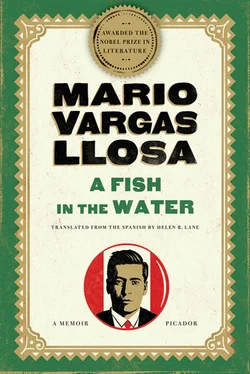Mario Vargas Llosa - A Fish in the Water - A Memoir
Здесь есть возможность читать онлайн «Mario Vargas Llosa - A Fish in the Water - A Memoir» весь текст электронной книги совершенно бесплатно (целиком полную версию без сокращений). В некоторых случаях можно слушать аудио, скачать через торрент в формате fb2 и присутствует краткое содержание. Год выпуска: 2015, Издательство: Macmillan, Жанр: Биографии и Мемуары, на английском языке. Описание произведения, (предисловие) а так же отзывы посетителей доступны на портале библиотеки ЛибКат.
- Название:A Fish in the Water: A Memoir
- Автор:
- Издательство:Macmillan
- Жанр:
- Год:2015
- ISBN:нет данных
- Рейтинг книги:3 / 5. Голосов: 1
-
Избранное:Добавить в избранное
- Отзывы:
-
Ваша оценка:
- 60
- 1
- 2
- 3
- 4
- 5
A Fish in the Water: A Memoir: краткое содержание, описание и аннотация
Предлагаем к чтению аннотацию, описание, краткое содержание или предисловие (зависит от того, что написал сам автор книги «A Fish in the Water: A Memoir»). Если вы не нашли необходимую информацию о книге — напишите в комментариях, мы постараемся отыскать её.
is a twofold book: a memoir of one of Latin America's most celebrated witers, beginning with his birth in 1936 in Arequipa, Peru; and the story of his organization of the reform movement which culminated in his bid for the Peruvian presidency in 1990.
A Fish in the Water: A Memoir — читать онлайн бесплатно полную книгу (весь текст) целиком
Ниже представлен текст книги, разбитый по страницам. Система сохранения места последней прочитанной страницы, позволяет с удобством читать онлайн бесплатно книгу «A Fish in the Water: A Memoir», без необходимости каждый раз заново искать на чём Вы остановились. Поставьте закладку, и сможете в любой момент перейти на страницу, на которой закончили чтение.
Интервал:
Закладка:
I didn’t have many contacts with the United States government during the campaign. Information in that country concerning what I was proposing was abundant and I took it for granted that, both at the State Department and at the White House, as well as in the political and economic organizations having to do with Latin America, there would be a positive attitude toward someone who defended a model of liberal democratic society and close and friendly ties with Western countries. Contacts with financial and economic organizations based in Washington — the World Bank, the International Monetary Fund, the Inter-American Bank for Development, in which the U.S. government had a decisive influence — were handled by Raúl Salazar and Lucho Bustamante and their collaborators and they kept me up to date on what appeared to be a good relationship. Before the campaign, on the basis of an article I wrote on Nicaragua for The New York Times , the secretary of state, George Shultz, had invited me to lunch in his office in Washington, a meeting at which we spoke of the relations between the United States and Latin America, as well as the specific problems of Peru, and in conjunction with that trip, thanks to the White House director of protocol, Selwa Roosevelt, an old friend, I had received an invitation to the White House, to a dinner dance, at which she introduced me, very briefly, to President Reagan. (My conversation with him didn’t deal with politics but with the writer Louis L’Amour, whom he admired.) On another occasion, I was invited to the State Department by Elliott Abrams, the under-secretary of state for Inter-American Affairs, to exchange ideas, with him and with other officials who dealt with that subregion, about Latin American problems. During the campaign itself I went to the United States on three occasions, on very short visits, to address the Peruvian communities in Miami, Los Angeles, and Washington, but only on the last of these trips did I pay a call on the leaders of both parties in Congress, to explain to them what I was attempting to do in Peru and what we hoped would be forthcoming from the United States should we win. Senator Edward Kennedy, who was not in the capital at the time, telephoned me to inform me that he was following my campaign closely and that he wished me luck. That was the sum total of my relations with the United States in those three years. The Democratic Front did not receive one cent of economic aid disbursed at the request of the United States, where, as is revealed by that CIA document, there were agencies which, because of my overly explicit defense of liberal democracy, were of the opinion that I represented a danger to the interests of the United States in the hemisphere.
Not all of the other episodes of the “dirty war” were as amusing as this one. Aside from the daily news of assassinations of activists of the Front in various places throughout the country, which sent the campaign into a state of shock, the government, in order to counteract the campaign of accusations concerning Fujimori’s real estate holdings and his business dealings, had relaunched its own campaign regarding my supposed income tax evasions, through the director of the Tax Office at the time, the diligent Major General Jorge Torres Aciego (whom Fujimori was later to reward for his services by appointing him minister of defense and later on ambassador to Israel), who kept sending his bureaucrats to the Tax Office daily with fantastic marginal annotations questioning my sworn tax declarations from previous years, amid stupendous publicity. Leaflets with the most absurd denunciations proliferated beyond measure throughout the streets of Lima and the provinces, and Álvaro found it impossible to take the time to deny all the lies or even read those dozens or hundreds of leaflets and pamphlets distributed to intoxicate public opinion, a campaign tactic employed by Hugo Otero, Guillermo Thorndike, and other of Alan García’s public relations amanuenses, who, in those final weeks, beat all previous records in the fabrication of printed shit. Álvaro selected a few pearls from that proliferating dung heap for our meetings together early each morning, and sometimes we exchanged ironic comments about my angelical intention of waging a campaign of ideas. One of the tracts dealt with my drug addiction; another showed me surrounded with naked women, along with a doctored version of an interview of me that had appeared in Playboy , and mused: “Could this be why he’s an atheist?” another invented a declaration by a National Committee of Women Catholics exhorting believers to “close ranks against the atheist” and another reproduced a news item from La República , with the dateline “La Paz, Bolivia,” in which “Aunt Julia,” my first wife, urged Peruvians not to vote for me but for Fujimori, something that she too promised to do (Lucho Llosa telephoned her to ask her if that statement was true, and she sent back a letter full of indignation at such slander). Another of the leaflets was a supposed letter from me to the militants of Libertad, in which, making a show of that brutal frankness I boasted of, I told them that, yes, we had to take jobs away from a million employees for the shock (the economic reform) to be a success, and that, without doubt, many thousands of Peruvians would die of hunger during the early days of the reforms, but after that there would be prosperous times, and that if, with the reform of education, hundreds of thousands of poor never learned how to read and write, things would be better for their children or their grandchildren, and that it was also true that I’d married one of my aunts and then a first cousin of mine and later on I might possibly marry a niece, and that I wasn’t ashamed of it because that was what freedom was for. That campaign ended with a masterstroke, two days before the election, a date when, according to the law, no more electoral propaganda was allowed, with an invention of the state-controlled TV channel, which announced that in Huancayo children had begun to die, “infected by food from the PAS, which is headed by Señora Patricia.”
Naturally, there were also a goodly number of fliers that attacked my adversary, some of them in such a base way that I wondered whether they’d come from us or whether they’d been conceived by the APRA to justify through such barefaced lies their accusations that we were racists. They almost invariably mentioned Fujimori’s Japanese origin, supposed brothels that he owned from which his father-in-law had made a fortune, accusations that he raped minors, and other such outrageous nonsense. Álvaro and Freddy Cooper assured me that those fliers had not come from our press office or from the campaign commando team, but I am certain that more than a few of them originated in one or another of the numerous — and at this juncture frenetic — authorities or offices of the Front.
The high point of the second campaign stage was to be my public debate with Fujimori. It was something we had been looking forward to and methodically preparing for. I had announced from the start of the campaign that I would not participate in a debate during the first round — a pointless waste of time for someone who was many points ahead in the polls — but that, if there were a second round, I would. Ever since I resumed campaigning, in mid-April, we had carefully placed a share of our hopes in that public debate in which I would strive to demonstrate conclusively the superiority of the Front’s proposal, with its Plan for Governing, its model of development, and its team of technicians, over Fujimori’s. The latter, aware of the weakness of his position in a public debate in which it would be impossible for him to avoid discussing concrete plans, tried to diminish that risk by challenging me not to one, but to several debates — four at first, and then six — on various subjects, and in different places around the country, while at the same time he thought up all sorts of subterfuges to get out of what had been his own proposal. But, in this regard, we were helped along by stories on the subject in the press and the impatience of public opinion, which demanded that the spectacle be shown on the TV screen. I said I would agree to no more than a single, thoroughgoing debate, on all the subjects of the program, and named a committee, made up of Álvaro, Luis Bustamante, and Alberto Borea, the aggressive leader of the Christian Popular Party, to negotiate the details. Álvaro has amusingly recounted the details of the negotiation, *in which Fujimori’s representatives went to unimaginable lengths to put obstacles in the way of the debate, and since they were given a great deal of daily coverage in the media, they contributed to creating what we were seeking: an enormous audience. The atmosphere of intensive preparation was such that almost all the television channels and radio networks in the country broadcast the debate live.
Читать дальшеИнтервал:
Закладка:
Похожие книги на «A Fish in the Water: A Memoir»
Представляем Вашему вниманию похожие книги на «A Fish in the Water: A Memoir» списком для выбора. Мы отобрали схожую по названию и смыслу литературу в надежде предоставить читателям больше вариантов отыскать новые, интересные, ещё непрочитанные произведения.
Обсуждение, отзывы о книге «A Fish in the Water: A Memoir» и просто собственные мнения читателей. Оставьте ваши комментарии, напишите, что Вы думаете о произведении, его смысле или главных героях. Укажите что конкретно понравилось, а что нет, и почему Вы так считаете.












